Bruker's Dimension Icon AFM integrates the most recent advancements of the company’s industry-leading nanoscale imaging and characterization technologies on a large-sample tip-scanning AFM platform.
The temperature-compensating position sensors of the Icon AFM render noise levels in the angstroms range for the X-Y axes and sub-angstroms range for the Z-axis. This performance level has defined the latest generations of what atomic force microscopy should be.
Ultimate Performance
- Distortion-free images are rendered instantly at drift rates of less than 200 pm per minute
- Considerably reduced noise floor at less than 30 pm allows imaging at sub-nanometer resolution
- Proprietary sensor design provides closed-loop performance with noise levels previously unattainable in an AFM
Enhanced Nanoscale Automation
AutoMET™ software, exclusively from Bruker, allows the combination of high-resolution AFM imaging with quick, automated metrology. It offers adaptability and excellent ease of use for performing critical-to-quality measurements in high-volume measurement applications.
The AutoMET™ software features a simple and intuitive recipe-writing environment that makes it very simple to reduce difficult measurement routines to easy, push-button operations.
Exceptional Productivity
- NanoScope® software and ScanAsyst® Imaging equipped with default experiment modes extract many years of knowledge into pre-configured settings
- Built-in alignment tools allow optimized and rapid positioning of probes
- X-Y positioning and a high-resolution camera provide quicker and more efficient navigation of samples

 Download: AFM Performance and Productivity Redefined
Download: AFM Performance and Productivity Redefined
Superior Versatility
- Custom user-programmable scripts enable semi-automated analysis and measurement
- Wide-open access to sample and tip accommodates a broad range of customized and standard experiments
- Software and instrument are designed to leverage all present and future AFM techniques and modes from Bruker
- PeakForce sMIM™ enables highly sensitive and thorough nanoscale mapping of conductivity and permittivity
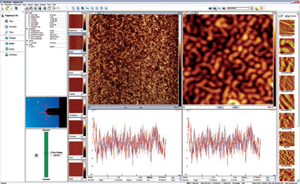
The intuitive graphical user interface provides immediate access to eight channels and extensive controller functions. Image data (left) show topography of triblock copolymer with 5Kx5K data. Image Credit: Bruker Nano Surfaces
Applications
Material Mapping
The Icon AFM supports the patented PeakForce QNM® Imaging Mode from Bruker, allowing scientists to quantitatively map and differentiate between nanomechanical characteristics while concurrently imaging the topography of samples at high resolution.
This technology works over a very wide range (10 pN to 10 μN for adhesion and 1 MPa to 50 GPA for modulus) to characterize many different types of samples.
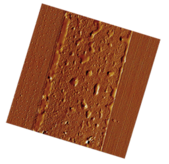
Image Credit: Bruker Nano Surfaces
Electrical Characterization
Proprietary modes enable electrical characterization at the nanoscale with greater dynamic range and sensitivity. These investigations can be combined with other methods, like Dark Lift, for artifact-free outcomes in scanning spreading resistance microscopy (SSRM), scanning capacitance microscopy (SCM), tunneling AFM (TUNA), and torsional resonance TUNA.
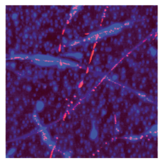
Image Credit: Bruker Nano Surfaces
Nanomanipulation
Lithography and manipulation can be carried out at the molecular and nanometer scales. The XYZ closed-loop scanner of the Icon AFM offers accurate positioning of probes without any piezo creep. It also offers very low noise for optimum positioning of any nanomanipulation system available.
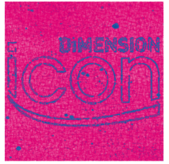
Image Credit: Bruker Nano Surfaces
Heating and Cooling
Thermal analysis and temperature control can be performed on samples from −35 °C to 250 °C while scanning in different AFM modes. Alternatively, a thermal probe can be used to carry out sub-100 nm local heating up to 400 °C.
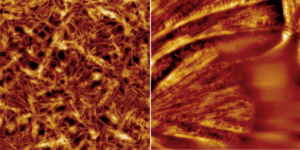
Image Credit: Bruker Nano Surfaces